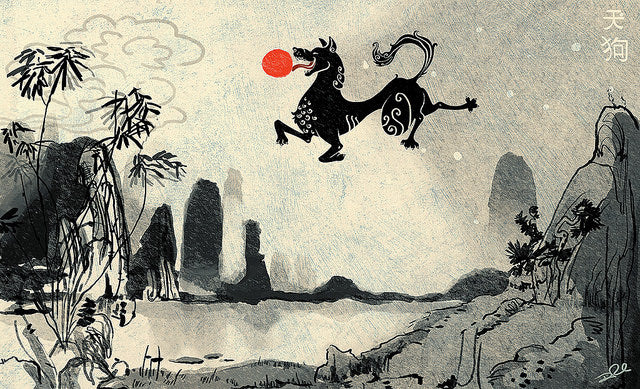
Fire Dogs and Angry Demons: Solar and Lunar Eclipse Myths from Asia
You might have heard that on Monday, August 21, parts of the United States will experience a total solar eclipse. That means the moon’s umbral shadow will swoop across the country from Oregon to South Carolina over the course of about 90 minutes. The states along the shadow’s path will experience “deep twilight” for two and a half minutes or more, while other places, like New York, will go dark for only a few seconds.
While we now understand a solar eclipse happens when the moon passes between the Earth and the sun (in a lunar eclipse, it's the Earth that gets between the moon and sun), back in the day many cultures believed supernatural forces were at work instead. Here we take a look at four such myths from Asia.
China: Oh heavenly dog!
The ancient Chinese believed that solar and lunar eclipses were caused by a hungry dog called Tiangou ("heaven dog"), trying to devour the sun or moon. The belief was so strong that it worked its way into the language: the terms for solar eclipse, rishi, and lunar eclipse, yueshi, translate literally as “sun eat” and “moon eat.” Luckily, Tiangou was always stopped by the god of childbirth, Zhang Xian, an expert archer.
However, just in case, preparations needed to be made to counter such frightening events — specifically, making a lot of noise to scare the creatures away. Failure to predict such events had dire consequences. In 2136 B.C., two of the emperor’s astronomers were beheaded for failing to foresee an eclipse.
Nowadays, the Chinese do what any of us would: record the whole thing and put it on the internet.
Hindu mythology: don’t lose your head

In Hindu mythology, the demon Rahu, or Phra Rahu in Thailand, is to blame for solar and lunar eclipses. Thirsty for immortality, he stole a sip of an eternal elixir, only to be spotted by the sun and moon, who promptly snitched on him to the god Vishnu.
Vishnu swiftly chopped off Rahu's head before the greedy demi-god could properly swallow the nectar, allowing only his noggin to live forever — and forever try to seek revenge on those two tattletales, the sun and the moon. Once in a while he catches and swallows them, but because he lacks a body, they fall right back out. In Thailand, Phra Rahu is bisected at the stomach, but the mechanics are the same.
Vietnam: A famished frog
The eating theme is also present in Vietnamese mythology — in this case, by a giant frog or toad with a real hankering for heavenly bodies. While his master, the lord of Hahn, slept, this oversized amphibian would sometimes manage to escape his golden chain to chow down on the moon or sun.
But before it could swallow either, the moon ladies hurried to wake the lord, who was the only one who could convince his slimy charge to cough up his treat. Today apparently young women still beat their rice-grinding bowls with pestles during eclipses.
Korea: Who let the (fire) dogs out?
In Korean myth, there are several realms of heaven, among them Gamangnara, or the Dark World. The Dark World’s king, weary of perpetual night, sent fierce fire dogs, or Bulgae, to steal the sun and moon.
However, the sun proved to be too hot and the moon too cold for the heavenly hounds to hold onto for long. They’d bite the orbs, only to burn or freeze their mouths, and spit them out. Soon they gave up and ran home, tails, presumably, between their legs. But not before leaving their marks in the form of sunspots and moon craters.
Want to learn more about Asian myths, legends, and culture? Check out our posts on Chinese wedding traditions, the Dragon Boat Festival, and the lunar zodiac.
"Tiangou." Illustration copyright © 2013 by David DePasquale (@davidadepasquale). Used with permission.
"Rahu swallowing the Moon" by Anandajoti Bhikkhu, CC BY 2.0
